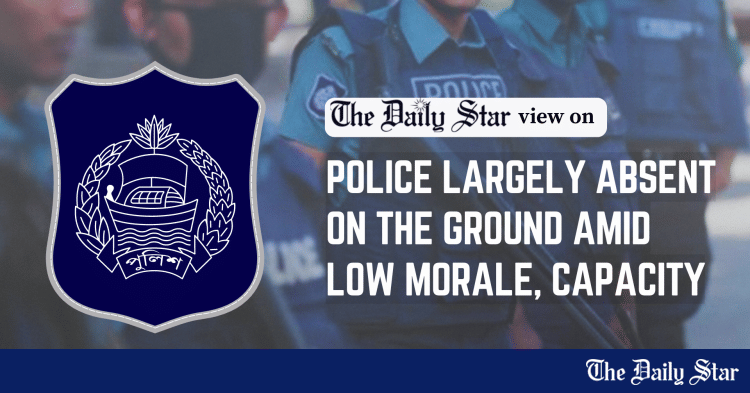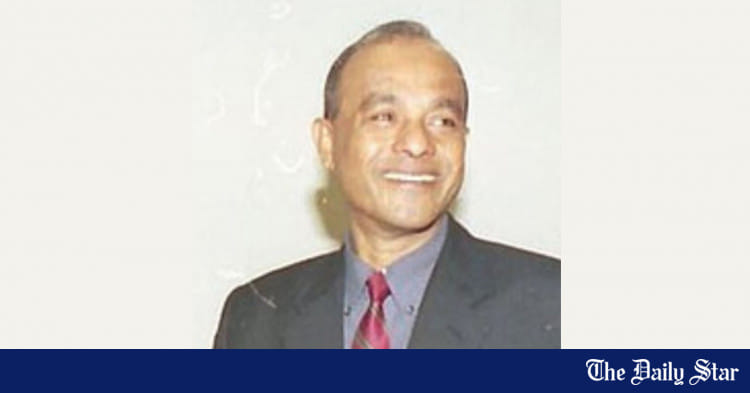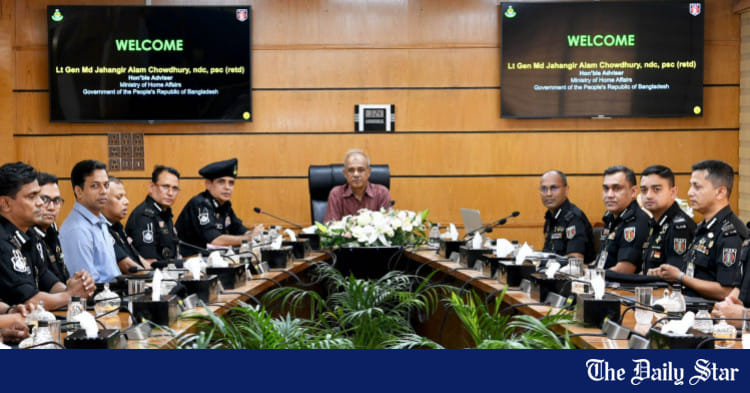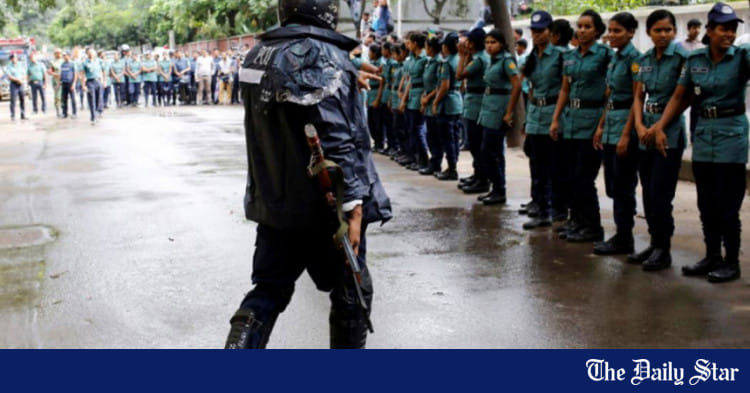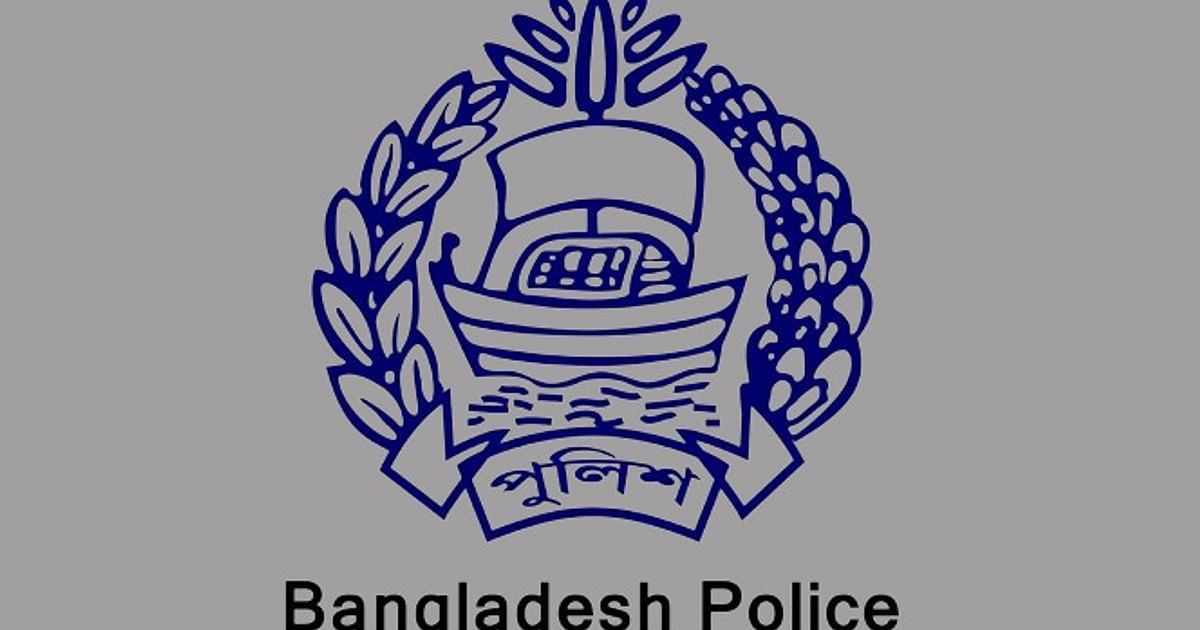Saif
Senior Member
- Joined
- Jan 24, 2024
- Messages
- 17,262
- Likes
- 8,334
- Nation

- Residence

- Axis Group

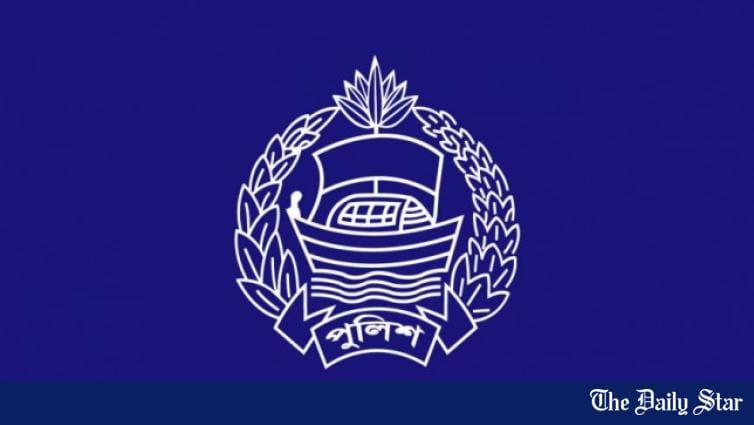
Major reshuffle in police force
In a major reshuffle in the police force yesterday, three top police officials have been sent into forced retirement and five mid-ranking officials, who had been forced to retire by the Awami League government, have been reinstated.
Major reshuffle in police force
3 top cops forced into retirement; 5 retired police officials reinstated

In a major reshuffle in the police force yesterday, three top police officials have been sent into forced retirement and five mid-ranking officials, who had been forced to retire by the Awami League government, have been reinstated.
Also, 24 district police superintendents were transferred to police units across the country.
The government also transferred 38 additional SP- and 14 assistant superintendent of police- (ASP) ranked officers from Dhaka Metropolitan Police to different police units, including in-service training centre, river police, and Rab.
Many of these officials have worked in the capital for years and had held major posts during the AL rule.
Forty-seven additional SP- and 10 ASP-ranked officers, who were outside Dhaka or in different units, have been transferred to the DMP.
Six deputy inspectors general and two additional inspectors general also got new posts.
Over the last one week, 13 top police officers have been sent into forced retirement in "public interest".
Many of these officials have been alleged to have used excessive force to suppress the student movement that toppled the AL government on August 5.
Much-talked-about names like Monirul Islam, additional IGP at Special Branch; Habibur Rahman, DMP commissioner; Atiqul Islam, additional IGP of police headquarters; Mohammad Ali Miah, CID chief; and Krishna Pada Roy, additional IGP of the Police Headquarters, were among those forced to retire.
Some of them have murder cases filed against them.
Police and home ministry sources said the changes were made as a part of measures to revamp the force that has been "politically used" for a long time.
"We have transferred the officials out of Dhaka as a part of measures to revamp the force," Md Mainul Hasan, commissioner of the DMP, told The Daily Star yesterday.
He said, "Capable, professional, and deprived officers are being selected for filling the vacant posts."
Muhammad Nurul Huda, a former inspector general of police, termed the moves "administrative measures or actions warranted by the present situation".
He told The Daily Star, "The officials, who have been given charge in new posts, should strictly follow the law so that the image [of the force] is restored."
REINSTATEMENTS, RETIREMENTS
With three circulars, the government yesterday sent three top police officials, including an additional inspector general of police (IGP), into forced retirement from today.
The officials are Krishna Pada Roy, additional IGP of police headquarters; Mozammel Haque, Khulna Metropolitan Police commissioner; and Sarder Rakibul Islam, additional commissioner.
The circular invoked section 45 of the Public Service Act, 2018.
The five reinstated police officials, who were forced to retire between 2020 and 2023, are Deputy Inspector General of police Abdullah Al Mamun, and SPs Nazmul Karim Khan, Ali Hossain Khan, Delwar Hossain Mia, and Zillur Rahman.
Five circulars were issued in this regard yesterday.
They would be considered on duty from the day of their forced retirement, and they would be entitled to arrears, promotions, and other benefits as per rules, read the circulars.
The home ministry during the AL rule had cited "public interest" as reason for them being forced to retire.
THE NEW TO BE WATCHED
Sources said many of the newly posted DMP officials do not have experience in working in the capital.
Talking to this newspaper, a source, requesting anonymity, said, "It would be hard for the newly appointed officers to perform their duties if they have no experience in dealing with crime in the capital … ."
DMP Commissioner Mainul said, "We will keep the newly transferred officials under the scanner and follow their work. If they fail to perform and maintain the professional standard, then they would be sent back.
"We want to ensure the best service to people … ."
Earlier, the authorities transferred all additional commissioners and deputy commissioners of eight crime divisions and eight detective branches of the DMP.
The officials, who were posted outside Dhaka, are now being given the charges of these divisions and DB branches.
NEW SPs, DIGs
The home ministry in another circular transferred the SPs of 24 districts.
New officials were also appointed to these districts.
The districts that got new SPs are Rangpur, Gazipur, Cumilla, Dhaka, Sirajganj, Chattogram, Manikganj, Mymensingh, Gaibandha, Habiganj, Rajshahi, Munshiganj, Sylhet, Narayanganj, Natore, Pabna, Patuakhali, Bagerhat, Kishoreganj, Jhenaidah, Magura, Tangail, Jashore, and Narsingdi.
In another circular, the home ministry yesterday transferred two additional inspectors general of police and six DIGs.
Additional IGP (supernumerary) AKM Hafiz Akter and KH Mahid Uddin were transferred to the Industrial Police and Tourist Police.
DIG Munibur Rahman of DMP was sent to the Armed Police Battalion headquarters while DIG Faruk Ahmed to the DMP.
DIGs (supernumerary) Israil Howlader, Khondoker Nazmul Hasan, Masud Karim, and Hasan Md Shawkat Ali were posted to the DMP.
3 top cops forced into retirement; 5 retired police officials reinstated
In a major reshuffle in the police force yesterday, three top police officials have been sent into forced retirement and five mid-ranking officials, who had been forced to retire by the Awami League government, have been reinstated.
Also, 24 district police superintendents were transferred to police units across the country.
The government also transferred 38 additional SP- and 14 assistant superintendent of police- (ASP) ranked officers from Dhaka Metropolitan Police to different police units, including in-service training centre, river police, and Rab.
Many of these officials have worked in the capital for years and had held major posts during the AL rule.
Forty-seven additional SP- and 10 ASP-ranked officers, who were outside Dhaka or in different units, have been transferred to the DMP.
Six deputy inspectors general and two additional inspectors general also got new posts.
Over the last one week, 13 top police officers have been sent into forced retirement in "public interest".
Many of these officials have been alleged to have used excessive force to suppress the student movement that toppled the AL government on August 5.
Much-talked-about names like Monirul Islam, additional IGP at Special Branch; Habibur Rahman, DMP commissioner; Atiqul Islam, additional IGP of police headquarters; Mohammad Ali Miah, CID chief; and Krishna Pada Roy, additional IGP of the Police Headquarters, were among those forced to retire.
Some of them have murder cases filed against them.
Police and home ministry sources said the changes were made as a part of measures to revamp the force that has been "politically used" for a long time.
"We have transferred the officials out of Dhaka as a part of measures to revamp the force," Md Mainul Hasan, commissioner of the DMP, told The Daily Star yesterday.
He said, "Capable, professional, and deprived officers are being selected for filling the vacant posts."
Muhammad Nurul Huda, a former inspector general of police, termed the moves "administrative measures or actions warranted by the present situation".
He told The Daily Star, "The officials, who have been given charge in new posts, should strictly follow the law so that the image [of the force] is restored."
REINSTATEMENTS, RETIREMENTS
With three circulars, the government yesterday sent three top police officials, including an additional inspector general of police (IGP), into forced retirement from today.
The officials are Krishna Pada Roy, additional IGP of police headquarters; Mozammel Haque, Khulna Metropolitan Police commissioner; and Sarder Rakibul Islam, additional commissioner.
The circular invoked section 45 of the Public Service Act, 2018.
The five reinstated police officials, who were forced to retire between 2020 and 2023, are Deputy Inspector General of police Abdullah Al Mamun, and SPs Nazmul Karim Khan, Ali Hossain Khan, Delwar Hossain Mia, and Zillur Rahman.
Five circulars were issued in this regard yesterday.
They would be considered on duty from the day of their forced retirement, and they would be entitled to arrears, promotions, and other benefits as per rules, read the circulars.
The home ministry during the AL rule had cited "public interest" as reason for them being forced to retire.
THE NEW TO BE WATCHED
Sources said many of the newly posted DMP officials do not have experience in working in the capital.
Talking to this newspaper, a source, requesting anonymity, said, "It would be hard for the newly appointed officers to perform their duties if they have no experience in dealing with crime in the capital … ."
DMP Commissioner Mainul said, "We will keep the newly transferred officials under the scanner and follow their work. If they fail to perform and maintain the professional standard, then they would be sent back.
"We want to ensure the best service to people … ."
Earlier, the authorities transferred all additional commissioners and deputy commissioners of eight crime divisions and eight detective branches of the DMP.
The officials, who were posted outside Dhaka, are now being given the charges of these divisions and DB branches.
NEW SPs, DIGs
The home ministry in another circular transferred the SPs of 24 districts.
New officials were also appointed to these districts.
The districts that got new SPs are Rangpur, Gazipur, Cumilla, Dhaka, Sirajganj, Chattogram, Manikganj, Mymensingh, Gaibandha, Habiganj, Rajshahi, Munshiganj, Sylhet, Narayanganj, Natore, Pabna, Patuakhali, Bagerhat, Kishoreganj, Jhenaidah, Magura, Tangail, Jashore, and Narsingdi.
In another circular, the home ministry yesterday transferred two additional inspectors general of police and six DIGs.
Additional IGP (supernumerary) AKM Hafiz Akter and KH Mahid Uddin were transferred to the Industrial Police and Tourist Police.
DIG Munibur Rahman of DMP was sent to the Armed Police Battalion headquarters while DIG Faruk Ahmed to the DMP.
DIGs (supernumerary) Israil Howlader, Khondoker Nazmul Hasan, Masud Karim, and Hasan Md Shawkat Ali were posted to the DMP.


































